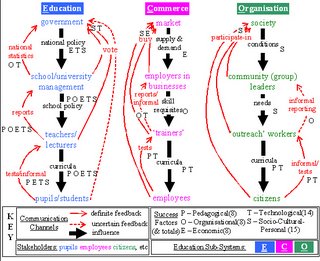SD of ESD
 Due to the convivial discussions I was having yesterday with friends I came to realise that some of the problems surrounding Sustainable Development will not be solved in my lifetime. It seems obvious really but sometimes the obvious things are the most difficult to realise! The solution, I propose (and which may have been proposed already, in fact I'd be very surprised if it has not) is to ensure that there is Sustainable Development of Education for Sustainable Development.
Due to the convivial discussions I was having yesterday with friends I came to realise that some of the problems surrounding Sustainable Development will not be solved in my lifetime. It seems obvious really but sometimes the obvious things are the most difficult to realise! The solution, I propose (and which may have been proposed already, in fact I'd be very surprised if it has not) is to ensure that there is Sustainable Development of Education for Sustainable Development.As I remember this is part of the rationale for UNU-IAS. Quite how this materialises I'm not sure yet but I suggest that any 'indicators' for ESD should include this perspective. The most obvious solution is that we perhaps ensure that we are not only educating 'citizens', be they pupils, employees or communities but we also educate the people with some degree of 'power', i.e. teachers, employers and community leaders and, further still, we educate governments, economic policy makers and societies (all of these examples are based on my GESSD-ECO model, above.) So, we have measurements of how effective the educational programmes for Sustainable Development are for the educators (and their superiors and the systems they are all a part of) as well as those being 'educated'.
Thus, the idea is that when the current generation who enjoy some degree of influence are no longer in such privileged positions and subsequent generations are steering the, hopefully sustainable, development of this planet then they too can maintain this current ESD perspective. As such it is something which is passed from one generation to the next and not simply reified as a flash in the pan because, ultimately, that approach will not work. We have created some unique situations on our planetary habitat which require a very long term perspective if we are to work towards minimising potential long term damage.
[sorry this doesn't indicate what's happening on the list, that will come, this represents my own thoughts...]

0 Comments:
Post a Comment
<< Home